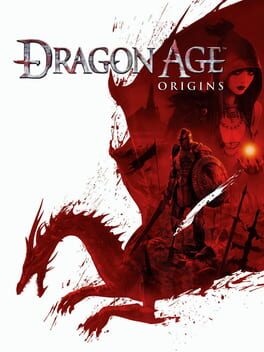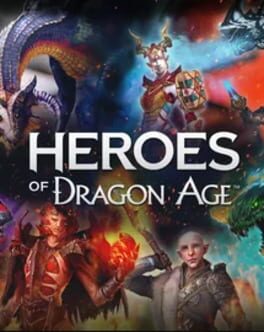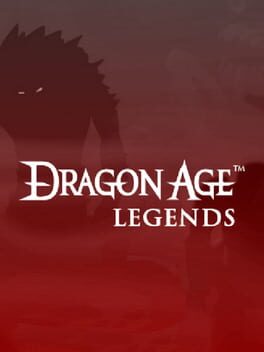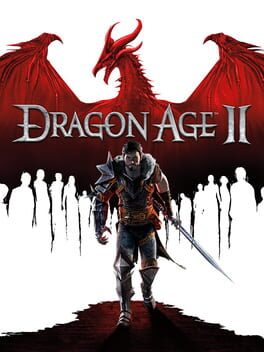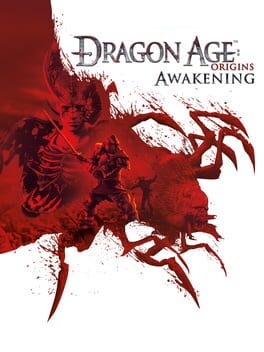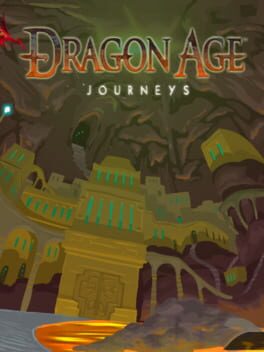

Dragon Age: Origins is a third-person role-playing game described as a spiritual successor to Baldur's Gate and Neverwinter Nights franchises. Players create their own character by customizing gender and appearance as well as choosing a race and class. Combat is in real time with the ability to pause at any moment: tactical options include an editor which allows the player to give the AI detailed instructions on how to behave in every possible situation. Although the main storyline is the same for every character created, the game features six unique prologues, two for each race. Dragon Age: Origins received critical acclaim upon release, with praise mostly directed at its story, setting, characters, music and combat system.
Also in series
Reviews View More
Given the amount of story pathways in this, I am choosing to post a few unsorted bullet points while acknowledging that I am not knowledgeable enough to come to a singular conclusion about its overall narrative and gameplay with only one playthrough:
Although it would not be a shock by-and-large to see Origins fail to meet weightier and complicated political questions given its limits as a mainstream CRPG, Orzammar is still surprising in how non-Dwarf playthroughs deprive the player of any meaningful information surrounding Orzammar’s central crisis or even any kind of wide-scale class tension outside of congressional halls. A small amount of credit can be given to the decision to have the city be built on a strict and repressive caste system, which in turn gives space for an emphasis on how fate (or rather, chance) and worth is intertwined with inequity and creates potentially meaningful scenarios including in one quest where a mom makes the sacrifice to escape the privileges of her upper caste to secure the life of her son while, simultaneously, being damned to poverty and isolation. I say “potentially” though to come to a more unfortunate conclusion: the extent of this depiction of caste is, at best, a shoulder-shrugging lament for Orzammar’s misfortune that doesn’t make any effort to interrogate how the political structures which hold it have been resisted or enabled. It would be unreasonable and unrealistic to have characters of every caste have clarified and knowledgeable positions of this system, but we instead see an opposite scenario where you would be remiss to find any acknowledgment of its cruelty by any citizen, politician or even outside agents. To clarify, I don’t intend to weigh my value of this story based on characters having or not having the “right opinion” (even if I did want to, you rarely find any characters who meaningfully defend caste either to criticize). Rather, I point to this as a means of emphasizing how caste does not exist as a sociopolitical construct in the eyes of the narrative that is upheld or resisted against, but rather as one of many quirks to Orzammar that can be filed away into the codex for lore as if it were just another worldbuilding ingredient in the broader recipe. At times, even Orzammar’s caste itself turns into a trivial challenge: The aforementioned quest I mentioned (Zerlinda’s Woe) leaves easy ways out for the titular character if you have high persuasion/intimidation, with only a few skill checks required to have her father become suddenly remorseful and willing to take her back in. Class tension is easily sliced through like cake with no permanent friction to be found in-between. Going back to the “crisis”, the passive interaction with caste here leads to what could be one of the game’s most meaningful sociopolitical decisions turned into a half-hearted story beat that is peppered through multiple fetch/combat quests. Little of Harrowmont or Bhelen’s political viewpoints can be understood before you’re asked to pick a side with the only “essential” knowledge being that both are corrupt politicians that are cutthroat in pursuing the throne. "They’re both the same", one lord remarks in resignation to you when you hand them evidence of Harrowmont’s corruption. Orzammar’s future under this framing can be simply decided with a coin flip with any tension only acting as a narrative excuse to go dungeon crawling. Although the Commoner Dwarf playthrough goes deeper into Orzammar’s caste dynamics to at least provide some depth towards the city’s hostility from what clips I have watched, any playthrough outside of that runs into a brick wall that would leave the player wondering why Origins feels so subtly apathetic to its own setting. Orzammar’s Deep Road (or the “anvil section”) gets somewhere more compelling, with souls robbed from flesh and melded into agents of war while subject to the whims of power-drunk figures flailing to recapture a sliver of the power their ancestors once held.
Much of what I described about Orzammar also applies to the overall racial dynamics surrounding Elf characters if you are not playing as a City Elf, in this case applying to my protagonist of choice who was a Elven Mage. BlazingWaters would also describe this narrative hollowness, so I'll mainly add here playing as an Elven Mage: As Grey Warden, you are still subject to racist comments made by other characters in light of your people having been torn apart by human society after generations of stable indigenous society. Yet, attempting to respond to it leaves you with little of anything beyond fleeting responses of surprise and mirth before segueing back into main quest talk. Again, we see a captivating background story giving sociopoliticial context, in this case being a lineage with allegories to Native American history, suddenly lose any sense of narrative weight in actual interactions. This is a tricker issue to consider though given the need to also give players space if they were to not want to engage in such an issue if they were to seek escapism. Even then, I saw clear narrative pathways to explore as a Mage Elf, a protagonist who is separated from his slowly dissipating indigenous lineage and only now realizing his history in adulthood after leaving his isolated tower, that were, again, left unexplored. City Elf characters would likely fare better in finding narrative opportunities surrounding exploring Dalish history and human racism, but, similar to the aforementioned Dwarf Commoner origin, it’s seen here how much of Origins’ exploration of Ferelden’s sociopolitical structure is oftentimes restricted to separate Origin stories rather than being more carefully integrated into the broader narrative of the main quest, which leaves only for failed potential as to what could have been explored in a fantasy world that was clearly given great care in its conception.
Numerous writings have likely been made about them already, but it is worth again emphasizing the talent of the voice cast here. Much can especially be said about each companion actor: Claudia Black and Steve Valentine’s respective performances as Morrigan and Alistair convincingly sell a dynamic built solely off of mutual hatred buffered by forced collaboration. Geraldine Blecker delivers a theatrical flair to her performance as Shale as he continually sneers at Ferelden society. Even companions that I had less experience with on this playthrough largely leave a mark, such as with Jon Curry’s mix of confidence and seduction as Zevran and Mark Hildreth’s stoic dominance as Sten. I would argue that for as much as BioWare made an effort in establishing a strong narrative core, the voice talent here practically carries the campaign more than any other aspect.
The flavor dialogue between companions should also be noted: it is a testament for each of the aforementioned voice actors and their writers in how they were able to successfully build a dynamic with each other on top of also narrating their individual stories, especially if these conversations were (I assume) recorded separately from each other. Companions were of course no new element to RPGs at the time Origins released, but coming off of playing Fallout 3 last year highlights how BioWare’s approach still feels fresh given their greater care in weaving a narrative built with interpersonal dynamics and conflicts in every waking moment rather than existing as isolated characters existing solely to bodyguard and talk to the player character.
There are still flaws with companion narratives though. Again, BlazingWaters would also point to this, so I’ll only re-emphasize the lack of danger, friction, or perhaps gameplay reward in building character relationships. I find it strange that meaningful dialogue with your companions gives little growth to relationship XP compared to spamming “Thoughtful Gift” purchases once you are flush with gold.
There is meaningful reward in interacting and learning about your companions on its own, but I state this to emphasize how relationship growth in Origins does not have any meaningful ties to other mechanics as what might be initially suggested.
I admittedly don’t have too much to say about the gameplay given that this is my first CRPG which leaves me not much room for comparison. That being said, the Mage class was a good intro into the genre for me given the flexibility to explore either group support (healing, defense) or individual combat abilities. I liked running a build that first emphasized healing and resistance glyphs before then also utilizing splash fire damage to play at both defense and combat angles. I don’t know if I would have had as much interest in the Warrior or Rogue pathways though given the (seemingly) lack of diversity in combat and healing pathways on both ends. This would be something I want to explore if I do a playthrough in the future.
The persistent blood spatter is one of the best aesthetic decisions made in Origins. Even with not much change in how such spatter is created, this acting as a mark of permanence also creates its own post-hoc friction where each combat encounter clearly leaves its mark in terms of enemy volume and gore and, in turn, reflects your effort in completing each encounter by providing a visual mark of accomplishment something beyond immediate progress and earned loot. I would be interested in seeing which games have tried to replicate this mechanic since I’m not sure if there are any that I can think of.
Although it would not be a shock by-and-large to see Origins fail to meet weightier and complicated political questions given its limits as a mainstream CRPG, Orzammar is still surprising in how non-Dwarf playthroughs deprive the player of any meaningful information surrounding Orzammar’s central crisis or even any kind of wide-scale class tension outside of congressional halls. A small amount of credit can be given to the decision to have the city be built on a strict and repressive caste system, which in turn gives space for an emphasis on how fate (or rather, chance) and worth is intertwined with inequity and creates potentially meaningful scenarios including in one quest where a mom makes the sacrifice to escape the privileges of her upper caste to secure the life of her son while, simultaneously, being damned to poverty and isolation. I say “potentially” though to come to a more unfortunate conclusion: the extent of this depiction of caste is, at best, a shoulder-shrugging lament for Orzammar’s misfortune that doesn’t make any effort to interrogate how the political structures which hold it have been resisted or enabled. It would be unreasonable and unrealistic to have characters of every caste have clarified and knowledgeable positions of this system, but we instead see an opposite scenario where you would be remiss to find any acknowledgment of its cruelty by any citizen, politician or even outside agents. To clarify, I don’t intend to weigh my value of this story based on characters having or not having the “right opinion” (even if I did want to, you rarely find any characters who meaningfully defend caste either to criticize). Rather, I point to this as a means of emphasizing how caste does not exist as a sociopolitical construct in the eyes of the narrative that is upheld or resisted against, but rather as one of many quirks to Orzammar that can be filed away into the codex for lore as if it were just another worldbuilding ingredient in the broader recipe. At times, even Orzammar’s caste itself turns into a trivial challenge: The aforementioned quest I mentioned (Zerlinda’s Woe) leaves easy ways out for the titular character if you have high persuasion/intimidation, with only a few skill checks required to have her father become suddenly remorseful and willing to take her back in. Class tension is easily sliced through like cake with no permanent friction to be found in-between. Going back to the “crisis”, the passive interaction with caste here leads to what could be one of the game’s most meaningful sociopolitical decisions turned into a half-hearted story beat that is peppered through multiple fetch/combat quests. Little of Harrowmont or Bhelen’s political viewpoints can be understood before you’re asked to pick a side with the only “essential” knowledge being that both are corrupt politicians that are cutthroat in pursuing the throne. "They’re both the same", one lord remarks in resignation to you when you hand them evidence of Harrowmont’s corruption. Orzammar’s future under this framing can be simply decided with a coin flip with any tension only acting as a narrative excuse to go dungeon crawling. Although the Commoner Dwarf playthrough goes deeper into Orzammar’s caste dynamics to at least provide some depth towards the city’s hostility from what clips I have watched, any playthrough outside of that runs into a brick wall that would leave the player wondering why Origins feels so subtly apathetic to its own setting. Orzammar’s Deep Road (or the “anvil section”) gets somewhere more compelling, with souls robbed from flesh and melded into agents of war while subject to the whims of power-drunk figures flailing to recapture a sliver of the power their ancestors once held.
Much of what I described about Orzammar also applies to the overall racial dynamics surrounding Elf characters if you are not playing as a City Elf, in this case applying to my protagonist of choice who was a Elven Mage. BlazingWaters would also describe this narrative hollowness, so I'll mainly add here playing as an Elven Mage: As Grey Warden, you are still subject to racist comments made by other characters in light of your people having been torn apart by human society after generations of stable indigenous society. Yet, attempting to respond to it leaves you with little of anything beyond fleeting responses of surprise and mirth before segueing back into main quest talk. Again, we see a captivating background story giving sociopoliticial context, in this case being a lineage with allegories to Native American history, suddenly lose any sense of narrative weight in actual interactions. This is a tricker issue to consider though given the need to also give players space if they were to not want to engage in such an issue if they were to seek escapism. Even then, I saw clear narrative pathways to explore as a Mage Elf, a protagonist who is separated from his slowly dissipating indigenous lineage and only now realizing his history in adulthood after leaving his isolated tower, that were, again, left unexplored. City Elf characters would likely fare better in finding narrative opportunities surrounding exploring Dalish history and human racism, but, similar to the aforementioned Dwarf Commoner origin, it’s seen here how much of Origins’ exploration of Ferelden’s sociopolitical structure is oftentimes restricted to separate Origin stories rather than being more carefully integrated into the broader narrative of the main quest, which leaves only for failed potential as to what could have been explored in a fantasy world that was clearly given great care in its conception.
Numerous writings have likely been made about them already, but it is worth again emphasizing the talent of the voice cast here. Much can especially be said about each companion actor: Claudia Black and Steve Valentine’s respective performances as Morrigan and Alistair convincingly sell a dynamic built solely off of mutual hatred buffered by forced collaboration. Geraldine Blecker delivers a theatrical flair to her performance as Shale as he continually sneers at Ferelden society. Even companions that I had less experience with on this playthrough largely leave a mark, such as with Jon Curry’s mix of confidence and seduction as Zevran and Mark Hildreth’s stoic dominance as Sten. I would argue that for as much as BioWare made an effort in establishing a strong narrative core, the voice talent here practically carries the campaign more than any other aspect.
The flavor dialogue between companions should also be noted: it is a testament for each of the aforementioned voice actors and their writers in how they were able to successfully build a dynamic with each other on top of also narrating their individual stories, especially if these conversations were (I assume) recorded separately from each other. Companions were of course no new element to RPGs at the time Origins released, but coming off of playing Fallout 3 last year highlights how BioWare’s approach still feels fresh given their greater care in weaving a narrative built with interpersonal dynamics and conflicts in every waking moment rather than existing as isolated characters existing solely to bodyguard and talk to the player character.
There are still flaws with companion narratives though. Again, BlazingWaters would also point to this, so I’ll only re-emphasize the lack of danger, friction, or perhaps gameplay reward in building character relationships. I find it strange that meaningful dialogue with your companions gives little growth to relationship XP compared to spamming “Thoughtful Gift” purchases once you are flush with gold.
There is meaningful reward in interacting and learning about your companions on its own, but I state this to emphasize how relationship growth in Origins does not have any meaningful ties to other mechanics as what might be initially suggested.
I admittedly don’t have too much to say about the gameplay given that this is my first CRPG which leaves me not much room for comparison. That being said, the Mage class was a good intro into the genre for me given the flexibility to explore either group support (healing, defense) or individual combat abilities. I liked running a build that first emphasized healing and resistance glyphs before then also utilizing splash fire damage to play at both defense and combat angles. I don’t know if I would have had as much interest in the Warrior or Rogue pathways though given the (seemingly) lack of diversity in combat and healing pathways on both ends. This would be something I want to explore if I do a playthrough in the future.
The persistent blood spatter is one of the best aesthetic decisions made in Origins. Even with not much change in how such spatter is created, this acting as a mark of permanence also creates its own post-hoc friction where each combat encounter clearly leaves its mark in terms of enemy volume and gore and, in turn, reflects your effort in completing each encounter by providing a visual mark of accomplishment something beyond immediate progress and earned loot. I would be interested in seeing which games have tried to replicate this mechanic since I’m not sure if there are any that I can think of.
With Veilguard announced, I decided to replay Origins for the first time eleven years, as I haven't touched it since I was 15. Even though this game is now 15 years old, it still gripped me just as much as it did when I first played it all those years ago.
One of the greatest strengths of the Dragon Age franchise is its setting. Thedas is so rich and vibrant, and even though Origins takes place entirely in Ferelden there's just enough information to get one curious about Orlais, the ominous Tevinter Imperium, Antiva, and especially Par Vollen. Dragon Age may have my favorite approach to elves in all fantasy with their long-lost fallen nation, traditions, and language. The Dwarves too deserve special mention with their declining empire and their never-ending battle against the Blight.
Speaking of the Blight, what an interesting concept to structure the world around and drive the plot! What do you mean that every couple of centuries, Darkspawn tunnel down a sleeping dragon god, corrupt it, and then march up to the surface to destroy or taint all life? WHAT DO YOU MEAN IT HAS HAPPENED FOUR TIMES BEFORE? Your first hand experience at Ostagar and the Codex entries picked up around the world really hammer home that this is absolutely apocalyptic. It has to be stopped - whether you wanted to be a Grey Warden or not.
As the title implies, Origins features many different origin stories for the protagonist. My personal favorite has always been the Dalish elf origin, although I recall having very fond memories of the Dwarven Noble path as well. At one point, I'm sure I played all of them in a fugue state as a teenager, but these are the two that stand out the best. Either way, it is such a dynamic and rich way to define your character, and sets up satisfying narratives when you inevitably return to your people.
I'll keep the story spoilers to the minimum, but generally I find the story quests of Origins to be interesting and fun (Except the Fade. The Fade sucks). Ironically, Orzammar and the Deep Roads was my favorite quest this time around, despite that being my most hated one when I first played the game. I might just be better at video games now than I was then.
Combat is fine. Nothing too remarkable to talk about. I played as an archer, but I often found myself enjoying taking over one of my mages for a while in combat.
Lastly, the characters!! The companions in this game are wonderful, funny, and a joy to speak with. This is the first game that I played that had party banter features, and so it felt very revolutionary at the time to hear Alistair and Wynne speak independently. They really felt alive. I struggle to think of any character I truly dislike, and I adore most of them. Some favorites will always be: Sten, Alistair, Wynne, and Shale.
It felt so good to step back into this world again. I missed it.
One of the greatest strengths of the Dragon Age franchise is its setting. Thedas is so rich and vibrant, and even though Origins takes place entirely in Ferelden there's just enough information to get one curious about Orlais, the ominous Tevinter Imperium, Antiva, and especially Par Vollen. Dragon Age may have my favorite approach to elves in all fantasy with their long-lost fallen nation, traditions, and language. The Dwarves too deserve special mention with their declining empire and their never-ending battle against the Blight.
Speaking of the Blight, what an interesting concept to structure the world around and drive the plot! What do you mean that every couple of centuries, Darkspawn tunnel down a sleeping dragon god, corrupt it, and then march up to the surface to destroy or taint all life? WHAT DO YOU MEAN IT HAS HAPPENED FOUR TIMES BEFORE? Your first hand experience at Ostagar and the Codex entries picked up around the world really hammer home that this is absolutely apocalyptic. It has to be stopped - whether you wanted to be a Grey Warden or not.
As the title implies, Origins features many different origin stories for the protagonist. My personal favorite has always been the Dalish elf origin, although I recall having very fond memories of the Dwarven Noble path as well. At one point, I'm sure I played all of them in a fugue state as a teenager, but these are the two that stand out the best. Either way, it is such a dynamic and rich way to define your character, and sets up satisfying narratives when you inevitably return to your people.
I'll keep the story spoilers to the minimum, but generally I find the story quests of Origins to be interesting and fun (Except the Fade. The Fade sucks). Ironically, Orzammar and the Deep Roads was my favorite quest this time around, despite that being my most hated one when I first played the game. I might just be better at video games now than I was then.
Combat is fine. Nothing too remarkable to talk about. I played as an archer, but I often found myself enjoying taking over one of my mages for a while in combat.
Lastly, the characters!! The companions in this game are wonderful, funny, and a joy to speak with. This is the first game that I played that had party banter features, and so it felt very revolutionary at the time to hear Alistair and Wynne speak independently. They really felt alive. I struggle to think of any character I truly dislike, and I adore most of them. Some favorites will always be: Sten, Alistair, Wynne, and Shale.
It felt so good to step back into this world again. I missed it.
